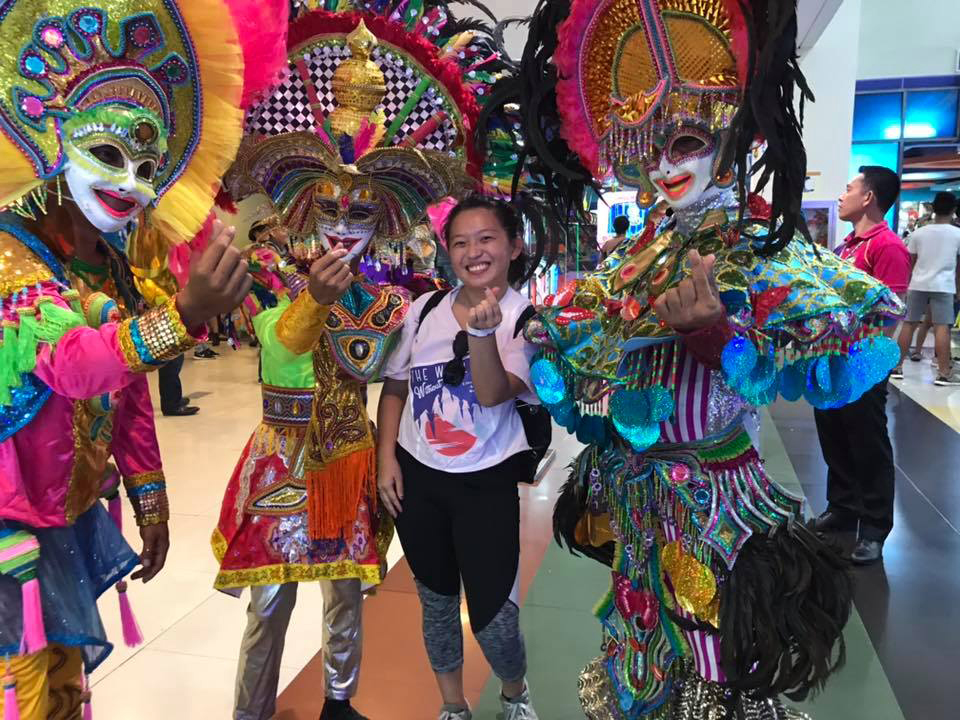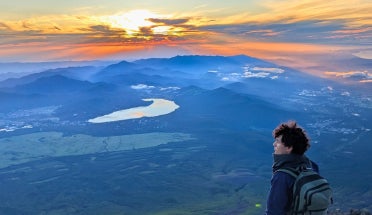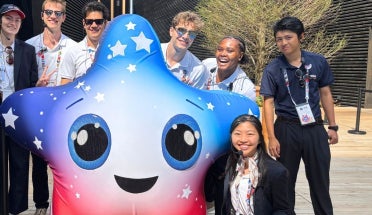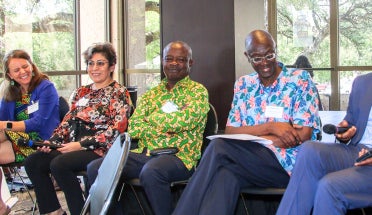
A Day in the Life of Stephanie Estrera ‘18: Peace Corps Volunteer in the Philippines
- Feb 22, 2019
- Peace Corps
For psychology alumna Stephanie Estrera, her time as a Peace Corps volunteer has been a way to connect with her own culture. Estrera grew up in Dallas, but her parents were born in South Korea and the Philippines. After briefly researching about the Philippines, she realized that being in the country was the best way to experience Filipino culture.
Estrera graduated last May and started serving as an education volunteer in the Philippines in July. Her job is to teach alongside Filipino teachers and work on projects such as a library development project. Her daily activities involve lots of interaction with the community, and her favorite part about being a Peace Corps volunteer is that she is accepted into a family, a home away from home.
We caught up with her and asked about what her typical day looks like, why she joined the Peace Corps and what valuable lessons she has learned so far.
Stephanie, how does your typical day look like?
Most weekdays, I wake up at 5:15 to go for a run through the town plaza, and get home by 5:50 to take a bucket bath. I get ready and arrive at school by 7 a.m. for the morning flag ceremony at the Elementary school I work in, which includes the Filipino National Anthem, a morning prayer, the pledge and Zumba. I co-teach English and Science sessions for Grade 6 with my Filipino counterpart.
At around 9:45 a.m., we break for recess and merienda (or snack time), which is a time I use to go and chat with the other teachers and staff. I spend lunch time in the room of my previous co-teacher and eat lunch with the PTA moms, mga lola (grandmothers) and other students. After lunch, I spend my afternoons lesson planning and working on my secondary projects, which currently is library development. I usually go home at around 5 p.m. and do yoga outside. I usually have dinner with my host mom and dad, and then I’ll spend the rest of the evening unwinding.

Describe your community and location.
I live in a 4th class city, with a population of over 80,000, whose economy relies on the sugar milling industry. I’m surrounded by sugar cane, and live in the poblacion, or the center of the city, allowing me easy access to the market, city hall and the school.
Why did you decide to join Peace Corps?
At the beginning of my senior year, I did a quick search of the Philippines on Google Images because I realized I didn’t know that much about the country. I saw photos of the Banuae rice terraces in Ifugao and the Chocolate Hills in Bohol and knew I needed to go there to truly connect to my culture. I started looking into opportunities that would allow me to live abroad but is focused on community building and sustainability. Peace Corps was one of the first things that came up for me, and the two-year commitment to a community is what sold me.
Describe your job.
I’m serving as an Education volunteer in the Philippines, and I’ve been in the Philippines since July 2018. My close of service date is September 2020.
As an Education volunteer, one of my jobs is to co-teach with Filipino teachers. Since I’m not a licensed teacher and I did not grow up in a Filipino classroom, co-teaching rather than teaching on my own is imperative. Co-teaching is an opportunity for cross-cultural exchange and to support the Filipino teachers at my school. Similar to the United States, the teachers in the Philippines are respected for their profession, but not compensated enough in their salaries. Many teachers are expected to take on more roles than just a mentor in the classroom, such as a soccer coach, a Girl Scout leader, and a club organizer. Personally, the school I work in lacks a school nurse and guidance counselor, which often poses a problem for the 2,500+ students who attend the school. Though my presence in the classroom is not a long-term solution, I view my time here as a fresh perspective for working through these daily challenges.
As a Peace Corps Volunteer, I also have the opportunity to work on secondary projects in the school community. Some of the projects I am working on right now include a library development program, a remedial reading program, and a leadership camp. I’m also hoping to bring a camp, workshop, or club that focuses on environmental education for my elementary school children. One of the things I love the most about Peace Corps is the emphasis on sustainability, meaning that any initiative should consider the feasibility of the community maintaining or replicating the project.
What is your favorite part of being a PCV?
Everything about my life in the Philippines revolves around relationships and community, which is something I really do adore about my service thus far. Even though I’m a new addition to the community, I feel as though I’m treated like family. Southern hospitality has nothing on Filipino hospitality. Even between the language barrier and cultural differences, there’s a warmth and kindness to the people who surround me. I have a lot of gratitude for my community, because they make it easy to feel welcome, safe and at ease while living in a place all the way on the other side of my home in Texas.

Oh, and the food that is native to my province, such as piaya (unleavened bread and muscovado) and chicken inasal (chargrilled chicken with soy sauce, calamansi, and peppers) are foods I crave almost every day. I just felt as though the food should get an honorable mention.
What are the hardest parts about being a PCV?
Other than the constant threat of natural disasters (hello, Pacific Ring of Fire), the bugs that thrive in such a tropical climate, and the heat and humidity, one of the hardest parts of my service thus far has been my self-imposed expectations. Most people apply to Peace Corps with the expectation that they’ll volunteer and change the world. I learned early on that it’s best to drop all expectations, and just be open to the experiences that come your way, because most of the time, you won’t see the fruits of your labor until much later on into your service (if at all). The lack of instant gratification can be a turn off for some, but I’ve come to realize that one of the best approaches the work I do here is to value the small wins. For me, small wins often times manifest themselves as pushing myself to build on the relationships and connections with those in my community, because at the end of the day, those relationships are what will matter the most.

What have you learned about yourself through your service?
All throughout my time at UT, I identified as someone who thrived in social situations and needed to have life planned out. While my outgoing personality works to my advantage at the site, I’ve also learned that I really do value the quiet, which gives me space to reflect. Though I love attending fiestas and partaking in the joyous seasons of life, I’ve found that I need time to myself. I have a new appreciation for the quiet that surrounds you when you’re by yourself, and it took a lot of self-reflection to realize this.
Life before Peace Corps worked around deadlines and the hustle of life in America, which was a source of both anxiety and security for me. My life in my Filipino community still runs on a schedule, but there are things that come up daily that one can’t always anticipate. For example, an incoming tropical cyclone sent me to Manila for a week with over 100 other volunteers for consolidation, just in case the storms made our sites too dangerous. My first two weeks at Community-Based Training were spent inside, and out of the schools, because it flooded so much that schools were canceled for almost two weeks. All of these experiences have made me more comfortable with a little spontaneity in life.
How will your service impact your career or career goals?
I spent most of my undergraduate career volunteering in psychology labs and wrote my thesis on the cultural variations in adults’ perceptions of intelligence. For most of my college career, I fostered an interest in developmental and cross-cultural psychology. While I’m open to the fact that my service may completely change my research interests, living within a Filipino community and exposing myself to a different culture will most definitely inform my future research interests. There is no doubt in my mind that my two years here will continue to impact the way I view the world and the choices I make.
What are your plans after you complete your service?
After I close of service in September 2020, I plan on taking time to travel around this side of the world and apply for Ph.D. programs in Psychology. I plan on submitting my applications in time to begin a program in Fall 2021, hopefully with clarity on what I want to research specifically.
What have you gained because of your experience in Peace Corps?
Volunteering can seem like a very performative act of selflessness, but we should acknowledge how selfish it can be as well. It’s not necessarily bad doing things selfishly either, because my short time here has already given me an appreciation for slowing down and savoring the relationships I’ve made. Furthermore, it’s taught me that patience with those around you and especially yourself is incredibly valuable. The people in my community abide by different values than the ones I was raised with in America, and I need to practice patience when interacting with them. More than that though, it’s so valuable to be patient with yourself, because not every day will be a huge accomplishment.
What would you say to current UT students considering applying to Peace Corps?
Apply with zero expectations of what your service will be like, or who you’ll become.



